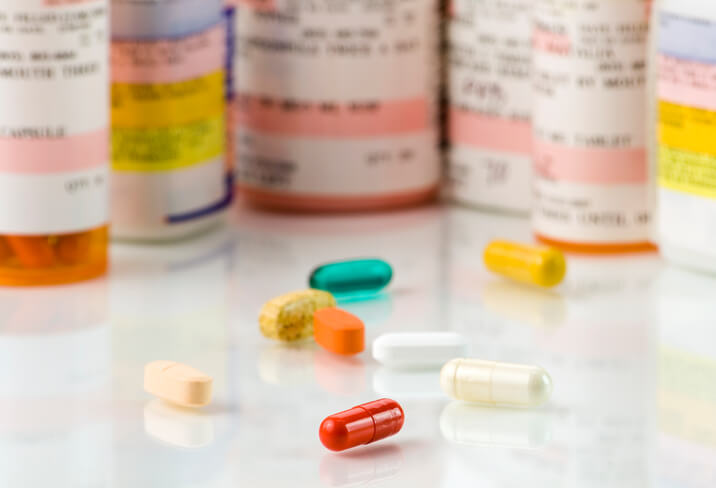Proton pump inhibitors (PPIs) like Nexium and Prevacid are incredibly popular with acid reflux sufferers. PPIs are so effective because they essentially eliminate gastric acid production in the stomach. While they can be helpful in the short-term, PPIs can also interfere with the way your stomach absorbs many medications. For this reason, certain prescription drugs that are vital to preserving your health may lose efficacy if you’re taking PPIs. To help you avoid this unintentional and potentially serious side effect, we’ll list the most dangerous PPI drug interactions below.
Even Over-the-Counter Heartburn Pills Can Cause Deadly Drug Interactions
Since PPIs significantly raise your stomach’s pH levels, they affect the pathways that you use to metabolize certain prescription medications. This often inhibits drug absorption as well as causing chronic vitamin B12, magnesium and iron deficiencies after long-term PPI use. For example: Some HIV and hepatitis C medications require sufficient gastric acid levels for proper absorption through your stomach. When combined, those PPI drug interactions make life-saving medications less effective, leading to severe health complications.
Potentially Fatal PPI Drug Interactions: Diazepam/Valium
Doctors usually prescribe benzodiazepines like Valium (also known as diazepam) to help balance brain chemicals that otherwise cause anxiety. While commonly used for managing symptoms from various anxiety disorders, Valium can also treat muscle spasms and alcohol withdrawal.
A 2012 study recommends doctors pay more attention to which prescription drugs don’t mix well with PPIs. There are several newly discovered dangerous drug interactions, specifically due to PPI-induced higher gastric pH levels found in patients’ stomachs. “With little difference among the PPIs in terms of clinical efficacy at equivalent doses, differences in drug interaction propensities become important factors in prescribing decisions,” the study concludes.
Researchers showed particular concern about PPI drug interactions with Valium, which has a narrow therapeutic window. PPIs slows down Valium absorption, since it takes more than twice as long to eliminate diazepam metabolites from your system. In other words, taking Valium and PPIs together could create toxic blood plasma levels, leading to accidental drug overdose.
Potentially Fatal PPI Drug Interactions: Plavix/Clopidogrel
Plavix (clopidogrel) is a popular blood thinner medication that prevents platelets in your blood from clotting together. Doctors might prescribe Plavix to prevent blood clots after your stroke or heart attack, which can cause severe or deadly complications.
Because PPIs affect the CYP2C19 enzyme – a common drug pathway – you may not fully metabolize certain medications into their active forms. Among the more serious PPI drug interactions, Plavix is one of the most well-researched and publicized. The FDA issued a 2010 safety warning to avoid Plavix drug interactions with omeprazole, as it may increase antiplatelet response. Other PPIs like esomeprazole, lansoprazole or pantoprazole don’t cause the same Plavix drug interactions that increase your blood clot risks.
Risky PPI Drug Interactions: Warfarin/Coumadin
Doctors typically prescribe anticoagulant medication Coumadin (warfarin) to DVT (deep vein thrombosis) and PE (pulmonary embolism) patients. Due to warfarin’s narrow therapeutic window, you should avoid PPI drug interactions whenever possible. Much like the Valium example mentioned above, combining PPIs and warfarin can cause improper drug absorption or even blood toxicity. A British study found co-administering PPIs and warfarin “may well result in a steady-state anticoagulation interference.” Regularly combining them could explain any anticoagulant monitoring fluctuations, since warfarin patients require monthly blood tests to ensure drug efficacy.
What You Can Do
If you experienced health complications from these drug interactions or other PPI-induced injuries, you may be eligible for financial compensation. To see if you may qualify for a cash settlement, fill out your free PPI claim evaluation today. An experienced attorney will review your information and call you to discuss your case and possible compensation options. Another good idea? Switch to a less-risky heartburn drug, like Pepcid AC or generic famotidine. They’re safe to take morning and night with no serious side effects.
Related: Studies Show Boomers, Seniors Often Inappropriately Prescribed PPIs
Mandy Voisin
Mandy Voisin is a freelance writer, blogger, and author of Girls of the Ocean and Star of Deliverance. As an accomplished content marketing consultant, mom of four and doctor's wife, Mandy has written hundreds of articles about dangerous drugs and medical devices, medical issues that impact disabled Americans, veterans' healthcare and workers' compensation issues since 2016.

